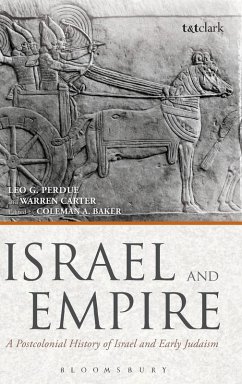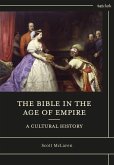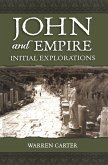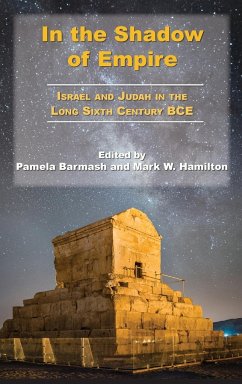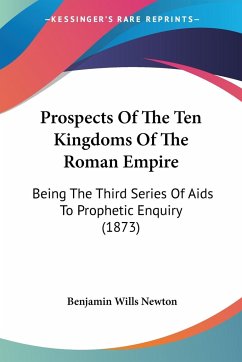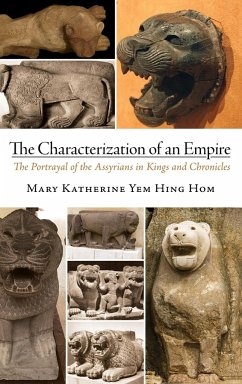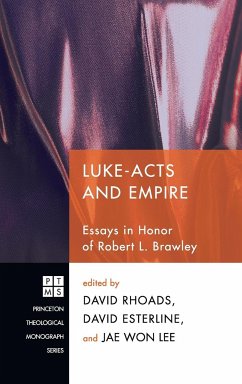- Gebundenes Buch
- Merkliste
- Auf die Merkliste
- Bewerten Bewerten
- Teilen
- Produkt teilen
- Produkterinnerung
- Produkterinnerung
This book is open access and available on www.bloomsburycollections.com. It is funded by Knowledge Unlatched. Israel and Empire introduces students to the history, literature, and theology of the Hebrew Bible and texts of early Judaism, enabling them to read these texts through the lens of postcolonial interpretation. This approach should allow students to recognize not only how cultural and socio-political forces shaped ancient Israel and the worldviews of the early Jews but also the impact of imperialism on modern readings of the Bible. Perdue and Niang cover a broad sweep of history, from…mehr
Andere Kunden interessierten sich auch für
![The Bible in the Age of Empire The Bible in the Age of Empire]() The Bible in the Age of Empire122,99 €
The Bible in the Age of Empire122,99 €![John and Empire John and Empire]() Warren CarterJohn and Empire201,99 €
Warren CarterJohn and Empire201,99 €![In the Shadow of Empire In the Shadow of Empire]() In the Shadow of Empire46,99 €
In the Shadow of Empire46,99 €![Prospects Of The Ten Kingdoms Of The Roman Empire Prospects Of The Ten Kingdoms Of The Roman Empire]() Benjamin Wills NewtonProspects Of The Ten Kingdoms Of The Roman Empire38,99 €
Benjamin Wills NewtonProspects Of The Ten Kingdoms Of The Roman Empire38,99 €![The Characterization of an Empire The Characterization of an Empire]() Mary Katherine Yem Hing HomThe Characterization of an Empire45,99 €
Mary Katherine Yem Hing HomThe Characterization of an Empire45,99 €![The End of the Days The End of the Days]() Guy LeeThe End of the Days18,99 €
Guy LeeThe End of the Days18,99 €![Luke-Acts and Empire Luke-Acts and Empire]() Luke-Acts and Empire35,99 €
Luke-Acts and Empire35,99 €-
-
-
This book is open access and available on www.bloomsburycollections.com. It is funded by Knowledge Unlatched. Israel and Empire introduces students to the history, literature, and theology of the Hebrew Bible and texts of early Judaism, enabling them to read these texts through the lens of postcolonial interpretation. This approach should allow students to recognize not only how cultural and socio-political forces shaped ancient Israel and the worldviews of the early Jews but also the impact of imperialism on modern readings of the Bible. Perdue and Niang cover a broad sweep of history, from 1300 BCE to 72 CE, including the late Bronze age, Egyptian imperialism, Israel's entrance into Canaan, the Davidic-Solomonic Empire, the Assyrian Empire, the Babylonian Empire, the Persian Empire, the Greek Empire, the Maccabean Empire, and Roman rule. Additionally the authors show how earlier examples of imperialism in the Ancient Near East provide a window through which to see the forces and effects of imperialism in modern history.
Produktdetails
- Produktdetails
- Verlag: Bloomsbury 3PL
- Seitenzahl: 340
- Erscheinungstermin: 20. November 2014
- Englisch
- Abmessung: 240mm x 161mm x 23mm
- Gewicht: 675g
- ISBN-13: 9780567054098
- ISBN-10: 0567054098
- Artikelnr.: 31586414
- Herstellerkennzeichnung
- Libri GmbH
- Europaallee 1
- 36244 Bad Hersfeld
- gpsr@libri.de
- Verlag: Bloomsbury 3PL
- Seitenzahl: 340
- Erscheinungstermin: 20. November 2014
- Englisch
- Abmessung: 240mm x 161mm x 23mm
- Gewicht: 675g
- ISBN-13: 9780567054098
- ISBN-10: 0567054098
- Artikelnr.: 31586414
- Herstellerkennzeichnung
- Libri GmbH
- Europaallee 1
- 36244 Bad Hersfeld
- gpsr@libri.de
Leo G. Perdue and Warren Carter
1. Beginnings
A. Introduction.
B. Definitions.
C. Methodology.
D. The Main Concerns of Postcolonialism: Characteristics of Subaltern
Writings and Readings in Religion and Theology.
2. The Crisis of the Late Bronze Age and the Spawning of New Empires and
Kingdoms (1250-1150 B.C.E.).
A. First Cause: Natural Cataclysm or the Conquest of Troy?
B. The Fall of Troy and the Mycenean and Minoan Empires
C. The Formation of New Kingdoms and Empires in Asia Minor
D. The Disruption of the Imperial Period in Egypt and the Decline of the
Ramesside Dynasty
E. The Fall of the Empire of the Mitanni
F. The Emergence of Assyria and Babylonia
3. Egyptian Imperialism: The Origins of Ancient Israel in Egypt (LBA)
A. The Ancient Near in the Late Bronze Age (1550-1200 B. C. E.)
B. The Egyptian Empires
C. Isael in Egypt: Slavery and Liberation
D. A Postcolonial Interpretation.
4. Liberated Colonies and the Formation of a Tribal Nation: Israel's
Entrance into Canaan and the Period of the Judges (Iron I)
A. Introduction: Canaan and the Early Iron Age (Iron I, 1200-1000 B. C. E.)
B. The "Conquest" of Canaan in Biblical Literature.
C. Three Historical Interpretations of Israel's Entrance to the Land:
Military Invasion, Peaceful Infiltration, and Revolution.
D. Postcolonial Interpretation
5. Imperialism in Early Israel: The Davidic-Solomonic Empire (1000-922 B.
C. E.)
A. The Failure of the Monarchy of Saul
B. The Kingship of David and the Israelite Empire
C. The Kingship of Solomon and the Development of the Empire
D. Postcolonial Interpretation
6. Imperialism: The Establishment of the Northern Empire (922-722 B. C. E.)
A. The Division of the Empire (The Divided Kingdoms)
B. The Northern Empire (Israel)
C. The Southern Kingdom (Judah)
D. Postcolonial Interpretation.
7. Imperialism: The Assyrian Empire (745-612 B. C. E.)
A. Israel
B. Judah
C. The DH and the Classical Prophets (First Isaiah and Jeremiah), a
Conflict in Ideologies.
D. Postcolonial Interpretation.
8. Imperialism: The Babylonian Empire (612 - 539 B. C. E.)
A. Judah as a political, social, and religious colony prior to rebellion
and the exile.
B. Exile and Deportation: Life in the Diaspora/Exile and the Means of
Preserving Identity
C. The Classical Prophets (Second Isaiah and Ezekiel): the new Exodus and
the New Jerusalem.
D. The Books of Job, Habakkuk, and Lamentations: a Time for Mourning and
Questioning.
E. Postcolonial Interpretation.
9. Imperialism: The Persian Empire (539-332 B. C. E.)
A. Imperial policies of the Achaemenid Dynasty: Cessation of Exile,
Requirements of Codification, and the Propaganda of Tolerance
B. The Return from Exile and the Rebuilding of the Temple
C. The Rebuilding of the City walls by Nehemiah
D. The Reform of Ezra and the Constructing of Second Temple Judaism
E. The Formulation of the Torah as the Central Defining Document for Early
Judaism
F. Postcolonial Interpretation.
10. Imperialism: The Greek Empire (332-164 B. C. E.)
A. Alexander the Great and Hellenism
B. The Ptolemies (312 -200 B. C. E.)
C. The Seleucids (200-164 B. C. E.)
D. The Book of Qoheleth as a Criticism of Divine Justice in Controlling
History
E. Early Apocalypticism: The Book of Daniel, the Isaiah Apocalypse,
Deutero-Zechariah (9-14), and the Book of Enoch.
G. The Development of Jewish Sects: Essenes (Qumran), Pharisees, Sadducees,
Hellenistic Judaism, and Zealots and their varied responses to Torah,
Hellenism, and imperialism
H. Postcolonial Interpretation.
I. Jewish Assimilation of Hellenistic Culture (especially in Egypt,
according to the Wisdom of Solomon); Jewish Toleration of Hellenism (Ben
Sira); the .Rejection of Hellenistic Culture (I Maccabees).
J. The Status of Women
K. Apocalyptic Vision: the Reign of God and the Defeat of the Wicked
Empires (Daniel and I Enoch).
11. Postcolonialism: the Maccabean Empire (164-63 B. C. E.)
A. National Self-Rule
B. The Importance of Temple, Torah, Jerusalem, and Empire (David and
Solomon)
C. Colony to Rome
D. The Partition into Kingdoms
E Postcolonial Interpretation
12. Neo-Imperialism: The Roman Rule of Judea in the Late Republic (65 B. C.
E.) and the Subsequent Empire (30 B. C. E.-72 C. E.)
A. Roman Imperial Policies
B. Jewish political and socio-religious life in the Roman Empire
C. The Great Revolt (66-72 C. E.) and the Destruction of Jerusalem
D. Postcolonial Interpretation
13. A Post-Colonial Postscript
A. Introduction.
B. Definitions.
C. Methodology.
D. The Main Concerns of Postcolonialism: Characteristics of Subaltern
Writings and Readings in Religion and Theology.
2. The Crisis of the Late Bronze Age and the Spawning of New Empires and
Kingdoms (1250-1150 B.C.E.).
A. First Cause: Natural Cataclysm or the Conquest of Troy?
B. The Fall of Troy and the Mycenean and Minoan Empires
C. The Formation of New Kingdoms and Empires in Asia Minor
D. The Disruption of the Imperial Period in Egypt and the Decline of the
Ramesside Dynasty
E. The Fall of the Empire of the Mitanni
F. The Emergence of Assyria and Babylonia
3. Egyptian Imperialism: The Origins of Ancient Israel in Egypt (LBA)
A. The Ancient Near in the Late Bronze Age (1550-1200 B. C. E.)
B. The Egyptian Empires
C. Isael in Egypt: Slavery and Liberation
D. A Postcolonial Interpretation.
4. Liberated Colonies and the Formation of a Tribal Nation: Israel's
Entrance into Canaan and the Period of the Judges (Iron I)
A. Introduction: Canaan and the Early Iron Age (Iron I, 1200-1000 B. C. E.)
B. The "Conquest" of Canaan in Biblical Literature.
C. Three Historical Interpretations of Israel's Entrance to the Land:
Military Invasion, Peaceful Infiltration, and Revolution.
D. Postcolonial Interpretation
5. Imperialism in Early Israel: The Davidic-Solomonic Empire (1000-922 B.
C. E.)
A. The Failure of the Monarchy of Saul
B. The Kingship of David and the Israelite Empire
C. The Kingship of Solomon and the Development of the Empire
D. Postcolonial Interpretation
6. Imperialism: The Establishment of the Northern Empire (922-722 B. C. E.)
A. The Division of the Empire (The Divided Kingdoms)
B. The Northern Empire (Israel)
C. The Southern Kingdom (Judah)
D. Postcolonial Interpretation.
7. Imperialism: The Assyrian Empire (745-612 B. C. E.)
A. Israel
B. Judah
C. The DH and the Classical Prophets (First Isaiah and Jeremiah), a
Conflict in Ideologies.
D. Postcolonial Interpretation.
8. Imperialism: The Babylonian Empire (612 - 539 B. C. E.)
A. Judah as a political, social, and religious colony prior to rebellion
and the exile.
B. Exile and Deportation: Life in the Diaspora/Exile and the Means of
Preserving Identity
C. The Classical Prophets (Second Isaiah and Ezekiel): the new Exodus and
the New Jerusalem.
D. The Books of Job, Habakkuk, and Lamentations: a Time for Mourning and
Questioning.
E. Postcolonial Interpretation.
9. Imperialism: The Persian Empire (539-332 B. C. E.)
A. Imperial policies of the Achaemenid Dynasty: Cessation of Exile,
Requirements of Codification, and the Propaganda of Tolerance
B. The Return from Exile and the Rebuilding of the Temple
C. The Rebuilding of the City walls by Nehemiah
D. The Reform of Ezra and the Constructing of Second Temple Judaism
E. The Formulation of the Torah as the Central Defining Document for Early
Judaism
F. Postcolonial Interpretation.
10. Imperialism: The Greek Empire (332-164 B. C. E.)
A. Alexander the Great and Hellenism
B. The Ptolemies (312 -200 B. C. E.)
C. The Seleucids (200-164 B. C. E.)
D. The Book of Qoheleth as a Criticism of Divine Justice in Controlling
History
E. Early Apocalypticism: The Book of Daniel, the Isaiah Apocalypse,
Deutero-Zechariah (9-14), and the Book of Enoch.
G. The Development of Jewish Sects: Essenes (Qumran), Pharisees, Sadducees,
Hellenistic Judaism, and Zealots and their varied responses to Torah,
Hellenism, and imperialism
H. Postcolonial Interpretation.
I. Jewish Assimilation of Hellenistic Culture (especially in Egypt,
according to the Wisdom of Solomon); Jewish Toleration of Hellenism (Ben
Sira); the .Rejection of Hellenistic Culture (I Maccabees).
J. The Status of Women
K. Apocalyptic Vision: the Reign of God and the Defeat of the Wicked
Empires (Daniel and I Enoch).
11. Postcolonialism: the Maccabean Empire (164-63 B. C. E.)
A. National Self-Rule
B. The Importance of Temple, Torah, Jerusalem, and Empire (David and
Solomon)
C. Colony to Rome
D. The Partition into Kingdoms
E Postcolonial Interpretation
12. Neo-Imperialism: The Roman Rule of Judea in the Late Republic (65 B. C.
E.) and the Subsequent Empire (30 B. C. E.-72 C. E.)
A. Roman Imperial Policies
B. Jewish political and socio-religious life in the Roman Empire
C. The Great Revolt (66-72 C. E.) and the Destruction of Jerusalem
D. Postcolonial Interpretation
13. A Post-Colonial Postscript
1. Beginnings
A. Introduction.
B. Definitions.
C. Methodology.
D. The Main Concerns of Postcolonialism: Characteristics of Subaltern
Writings and Readings in Religion and Theology.
2. The Crisis of the Late Bronze Age and the Spawning of New Empires and
Kingdoms (1250-1150 B.C.E.).
A. First Cause: Natural Cataclysm or the Conquest of Troy?
B. The Fall of Troy and the Mycenean and Minoan Empires
C. The Formation of New Kingdoms and Empires in Asia Minor
D. The Disruption of the Imperial Period in Egypt and the Decline of the
Ramesside Dynasty
E. The Fall of the Empire of the Mitanni
F. The Emergence of Assyria and Babylonia
3. Egyptian Imperialism: The Origins of Ancient Israel in Egypt (LBA)
A. The Ancient Near in the Late Bronze Age (1550-1200 B. C. E.)
B. The Egyptian Empires
C. Isael in Egypt: Slavery and Liberation
D. A Postcolonial Interpretation.
4. Liberated Colonies and the Formation of a Tribal Nation: Israel's
Entrance into Canaan and the Period of the Judges (Iron I)
A. Introduction: Canaan and the Early Iron Age (Iron I, 1200-1000 B. C. E.)
B. The "Conquest" of Canaan in Biblical Literature.
C. Three Historical Interpretations of Israel's Entrance to the Land:
Military Invasion, Peaceful Infiltration, and Revolution.
D. Postcolonial Interpretation
5. Imperialism in Early Israel: The Davidic-Solomonic Empire (1000-922 B.
C. E.)
A. The Failure of the Monarchy of Saul
B. The Kingship of David and the Israelite Empire
C. The Kingship of Solomon and the Development of the Empire
D. Postcolonial Interpretation
6. Imperialism: The Establishment of the Northern Empire (922-722 B. C. E.)
A. The Division of the Empire (The Divided Kingdoms)
B. The Northern Empire (Israel)
C. The Southern Kingdom (Judah)
D. Postcolonial Interpretation.
7. Imperialism: The Assyrian Empire (745-612 B. C. E.)
A. Israel
B. Judah
C. The DH and the Classical Prophets (First Isaiah and Jeremiah), a
Conflict in Ideologies.
D. Postcolonial Interpretation.
8. Imperialism: The Babylonian Empire (612 - 539 B. C. E.)
A. Judah as a political, social, and religious colony prior to rebellion
and the exile.
B. Exile and Deportation: Life in the Diaspora/Exile and the Means of
Preserving Identity
C. The Classical Prophets (Second Isaiah and Ezekiel): the new Exodus and
the New Jerusalem.
D. The Books of Job, Habakkuk, and Lamentations: a Time for Mourning and
Questioning.
E. Postcolonial Interpretation.
9. Imperialism: The Persian Empire (539-332 B. C. E.)
A. Imperial policies of the Achaemenid Dynasty: Cessation of Exile,
Requirements of Codification, and the Propaganda of Tolerance
B. The Return from Exile and the Rebuilding of the Temple
C. The Rebuilding of the City walls by Nehemiah
D. The Reform of Ezra and the Constructing of Second Temple Judaism
E. The Formulation of the Torah as the Central Defining Document for Early
Judaism
F. Postcolonial Interpretation.
10. Imperialism: The Greek Empire (332-164 B. C. E.)
A. Alexander the Great and Hellenism
B. The Ptolemies (312 -200 B. C. E.)
C. The Seleucids (200-164 B. C. E.)
D. The Book of Qoheleth as a Criticism of Divine Justice in Controlling
History
E. Early Apocalypticism: The Book of Daniel, the Isaiah Apocalypse,
Deutero-Zechariah (9-14), and the Book of Enoch.
G. The Development of Jewish Sects: Essenes (Qumran), Pharisees, Sadducees,
Hellenistic Judaism, and Zealots and their varied responses to Torah,
Hellenism, and imperialism
H. Postcolonial Interpretation.
I. Jewish Assimilation of Hellenistic Culture (especially in Egypt,
according to the Wisdom of Solomon); Jewish Toleration of Hellenism (Ben
Sira); the .Rejection of Hellenistic Culture (I Maccabees).
J. The Status of Women
K. Apocalyptic Vision: the Reign of God and the Defeat of the Wicked
Empires (Daniel and I Enoch).
11. Postcolonialism: the Maccabean Empire (164-63 B. C. E.)
A. National Self-Rule
B. The Importance of Temple, Torah, Jerusalem, and Empire (David and
Solomon)
C. Colony to Rome
D. The Partition into Kingdoms
E Postcolonial Interpretation
12. Neo-Imperialism: The Roman Rule of Judea in the Late Republic (65 B. C.
E.) and the Subsequent Empire (30 B. C. E.-72 C. E.)
A. Roman Imperial Policies
B. Jewish political and socio-religious life in the Roman Empire
C. The Great Revolt (66-72 C. E.) and the Destruction of Jerusalem
D. Postcolonial Interpretation
13. A Post-Colonial Postscript
A. Introduction.
B. Definitions.
C. Methodology.
D. The Main Concerns of Postcolonialism: Characteristics of Subaltern
Writings and Readings in Religion and Theology.
2. The Crisis of the Late Bronze Age and the Spawning of New Empires and
Kingdoms (1250-1150 B.C.E.).
A. First Cause: Natural Cataclysm or the Conquest of Troy?
B. The Fall of Troy and the Mycenean and Minoan Empires
C. The Formation of New Kingdoms and Empires in Asia Minor
D. The Disruption of the Imperial Period in Egypt and the Decline of the
Ramesside Dynasty
E. The Fall of the Empire of the Mitanni
F. The Emergence of Assyria and Babylonia
3. Egyptian Imperialism: The Origins of Ancient Israel in Egypt (LBA)
A. The Ancient Near in the Late Bronze Age (1550-1200 B. C. E.)
B. The Egyptian Empires
C. Isael in Egypt: Slavery and Liberation
D. A Postcolonial Interpretation.
4. Liberated Colonies and the Formation of a Tribal Nation: Israel's
Entrance into Canaan and the Period of the Judges (Iron I)
A. Introduction: Canaan and the Early Iron Age (Iron I, 1200-1000 B. C. E.)
B. The "Conquest" of Canaan in Biblical Literature.
C. Three Historical Interpretations of Israel's Entrance to the Land:
Military Invasion, Peaceful Infiltration, and Revolution.
D. Postcolonial Interpretation
5. Imperialism in Early Israel: The Davidic-Solomonic Empire (1000-922 B.
C. E.)
A. The Failure of the Monarchy of Saul
B. The Kingship of David and the Israelite Empire
C. The Kingship of Solomon and the Development of the Empire
D. Postcolonial Interpretation
6. Imperialism: The Establishment of the Northern Empire (922-722 B. C. E.)
A. The Division of the Empire (The Divided Kingdoms)
B. The Northern Empire (Israel)
C. The Southern Kingdom (Judah)
D. Postcolonial Interpretation.
7. Imperialism: The Assyrian Empire (745-612 B. C. E.)
A. Israel
B. Judah
C. The DH and the Classical Prophets (First Isaiah and Jeremiah), a
Conflict in Ideologies.
D. Postcolonial Interpretation.
8. Imperialism: The Babylonian Empire (612 - 539 B. C. E.)
A. Judah as a political, social, and religious colony prior to rebellion
and the exile.
B. Exile and Deportation: Life in the Diaspora/Exile and the Means of
Preserving Identity
C. The Classical Prophets (Second Isaiah and Ezekiel): the new Exodus and
the New Jerusalem.
D. The Books of Job, Habakkuk, and Lamentations: a Time for Mourning and
Questioning.
E. Postcolonial Interpretation.
9. Imperialism: The Persian Empire (539-332 B. C. E.)
A. Imperial policies of the Achaemenid Dynasty: Cessation of Exile,
Requirements of Codification, and the Propaganda of Tolerance
B. The Return from Exile and the Rebuilding of the Temple
C. The Rebuilding of the City walls by Nehemiah
D. The Reform of Ezra and the Constructing of Second Temple Judaism
E. The Formulation of the Torah as the Central Defining Document for Early
Judaism
F. Postcolonial Interpretation.
10. Imperialism: The Greek Empire (332-164 B. C. E.)
A. Alexander the Great and Hellenism
B. The Ptolemies (312 -200 B. C. E.)
C. The Seleucids (200-164 B. C. E.)
D. The Book of Qoheleth as a Criticism of Divine Justice in Controlling
History
E. Early Apocalypticism: The Book of Daniel, the Isaiah Apocalypse,
Deutero-Zechariah (9-14), and the Book of Enoch.
G. The Development of Jewish Sects: Essenes (Qumran), Pharisees, Sadducees,
Hellenistic Judaism, and Zealots and their varied responses to Torah,
Hellenism, and imperialism
H. Postcolonial Interpretation.
I. Jewish Assimilation of Hellenistic Culture (especially in Egypt,
according to the Wisdom of Solomon); Jewish Toleration of Hellenism (Ben
Sira); the .Rejection of Hellenistic Culture (I Maccabees).
J. The Status of Women
K. Apocalyptic Vision: the Reign of God and the Defeat of the Wicked
Empires (Daniel and I Enoch).
11. Postcolonialism: the Maccabean Empire (164-63 B. C. E.)
A. National Self-Rule
B. The Importance of Temple, Torah, Jerusalem, and Empire (David and
Solomon)
C. Colony to Rome
D. The Partition into Kingdoms
E Postcolonial Interpretation
12. Neo-Imperialism: The Roman Rule of Judea in the Late Republic (65 B. C.
E.) and the Subsequent Empire (30 B. C. E.-72 C. E.)
A. Roman Imperial Policies
B. Jewish political and socio-religious life in the Roman Empire
C. The Great Revolt (66-72 C. E.) and the Destruction of Jerusalem
D. Postcolonial Interpretation
13. A Post-Colonial Postscript

